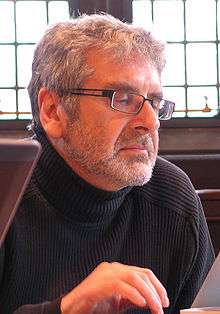Alexander Etkind
Alexander Etkind (born 1955, St. Petersburg, Russia) is a historian and cultural scientist.[1][2] He is a professor of history and the Chair of Russia-Europe relations at the European University Institute.[3]

Career
He completed his B.A. and M.A. in 1978 in Psychology and English at Leningrad State University.[3] In 1985, he completed a PhD in Psychology at Bekhterev Institute, Leningrad and, 1998, completed an additional PhD (Habilitation) in Slavonic Studies at the University of Helsinki.[2][4][3] Etkind taught at both the European University at St. Petersburg then at Cambridge University where he was also a fellow of King's College.[5][2] He was a visiting fellow at New York University, Wissenschaftskolleg in Berlin, and other places.[6][3][7]
Etkind's research focuses on European and Russian intellectual history, memory studies, natural resources and the history of political economy, empire and colonies in Europe, and Russian politics, novels and film in the 21st century.[3][8]
From 2010 to 2013 he led the international research project “Memory at War: Cultural Dynamics in Poland, Russia, and Ukraine”. The project studied the role of cultural memory of the Soviet era in Russia, Ukraine and Poland and received funding from Humanities in the European Research Area (HERA).[8]
Etkind has publications in Russian and English, and speaks both languages.[3][4]
Selected publications
- Roads not Taken. An Intellectual Biography of William C. Bullitt. Pittsburgh University Press 2017.
- Cultural Forms of Protest in Russia, co-ed. with B. Beumers, O. Gurova and S. Turoma. New York: Routledge, 2017.
- “How Russia Colonized Itself. Internal Colonization in Classical Russian Historiography”, International Journal for History, Culture, and Modernity, Vol 3, No. 2, 2015, pp 159-172.
- “Post-Soviet Russia: The Land of the Oil Curse, Pussy Riot, and Magical Historicism” Boundary 2, Vol 41, No. 1, 2014, pp. 153–170.
- Memory and Theory in Eastern Europe, co-ed. with U. Blacker and J. Fedor, New York: Palgrave Macmillan, 2013.
- Warped Mourning. Stories of the Undead in the Land of the Unburied, Palo Alto: Stanford University Press, 2013.
- Remembering Katyn. Cambridge: Polity 2012, co-authored
- Internal Colonization. Russia’s Imperial Experience, Cambridge: Polity 2011
- “A Parable of Misrecognition: Anagnorisis and the Return of the Repressed from the Gulag,” Russian Review 68 (October 2009): 623-40
- “Stories of the Undead in the Land of the Unburied: Magical Historicism in Contemporary Russian Fiction” Slavic Review 68, no. 3, Fall 2009, pp. 631–658.
- Хлыст: Секты, литература и революция (The Russian Flagellant: Sects, Literature, and Revolution) Moscow: NLO 1998; second revised edition: 2013
- Eros of the Impossible: The History of Psychoanalysis in Russia. Boulder - Oxford: Westview 1996
References
- "Katalog der Deutschen Nationalbibliothek". portal.dnb.de. Retrieved 2020-06-22.
- Science, London School of Economics and Political. "A Natural History of Evil: Postcolonial and Postsocialist Approaches". London School of Economics and Political Science. Retrieved 2020-06-22.
- "Alexander Etkind". European University Institute. Retrieved 2020-06-22.
- "Participants". Digital Яhetoric. 2014-06-16. Retrieved 2020-06-22.
- Etkind, Alexander (2017-11-09). Roads Not Taken: An Intellectual Biography of William C. Bullitt. University of Pittsburgh Press. ISBN 978-0-8229-6503-9.
- "Roads Not Taken: Book presentation with Alexander Etkind". The University of Edinburgh. Retrieved 2020-06-22.
- "Wissenschaftskolleg zu Berlin: Alexander Etkind, Ph.D." Alexander Etkind, Ph.D. Retrieved 2020-06-23.
- "'Memory wars' of Eastern Europe". University of Cambridge. 2010-04-01. Retrieved 2020-06-22.